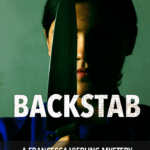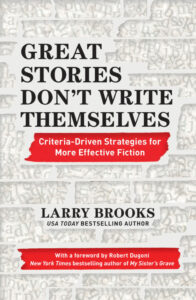
(Purchased photo via iStock)
Greetings, readers and writers all! It’s First Page Critique time. Please take a few moments to read the submission, and my critique–then share your thoughts and advice in the comments.
THE PURPLE DOOR
CHAPTER ONE
Christina
Thursday, October 1
For the first time since Christina buried the yellow bag, it was time to check in. She was in no shape for it. She hadn’t slept in two days, maybe longer, and the Storm was here.
She stood at one of the windows, the old boarding house creaking in the wind. The Storm poured out of her unwell mind, blurred the pane of glass, blended with the actual, physical storm outside. The leaves on the treetops shook with tethered fury, and lightning splashed over the street. She looked down over the neighborhood, her ceaseless thoughts flowing out into the raindrops watering the ground.
So much had happened in a month, most of it bad. But she’d found something unexpected at the Purple Door. This attic room had become home.
She’d made herself a nest. Up in this high-raftered roost, working on the mural and listening to her records as loud as she wanted, talking to Adam until the sun came up, this place was her whole world. Everything and everyone she needed was here… and all the little things she didn’t need, she’d buried.
She was going to stay right here. So she had to pass this phone call.
Christina dropped the curtain on her faint reflection in the glass, a flash of long blond hair. She had to be ready. She began to pace, staring into the fathomless black face of her phone until it lit up in her hand:
“DAD”
The name leapt off the screen in all caps, a visual shock. It was a trick she used in order to focus, now that the crazy thoughts her meds used to kill were back in bloom.
She’d buried her pills, and several other problematic artifacts, in little holes around the boarding house. In the back yard, a gauzy yellow bag that used to shimmer in the light was now stuffed with tablets of lithium, lamictal, and clozapine, and sealed underground with three feet of dirt. She was up here without a net.
________
Let’s start this party with a quote from William Howard Taft, 27th President of the United States, and 10thChief Justice of the United States:
Don’t write so that you can be understood, write so that you can’t be misunderstood.
This is a big deal when it comes to writing (or speaking), and it’s uniquely critical when a writer is creating a fictional world for the reader. If the reader feels unbalanced by the prose, or more confused than fascinated, the writer may lose them. Below I’ll discuss how this is relevant.
There’s so very much to like about this submission, The Purple Door.
–Christina is a vibrant protagonist. She’s a person of strong will and motivation.
–Dreamlike imagery
–Precise language
-Compelling portrait of a young woman with brain differences
“For the first time since Christina buried the yellow bag, it was time to check in. She was in no shape for it. She hadn’t slept in two days, maybe longer, and the Storm was here.
She stood at one of the windows, the old boarding house creaking in the wind. The Storm poured out of her unwell mind, blurred the pane of glass, blended with the actual, physical storm outside. The leaves on the treetops shook with tethered fury, and lightning splashed over the street. She looked down over the neighborhood, her ceaseless thoughts flowing out into the raindrops watering the ground.”
The first thing I imagined when I read this opening was that Christina was either a witch or a superhero who was maybe checking in with her handler. I had no clear idea what kind of this story was. Call me overly literal, but I cannot lie.
The second paragraph, about the Storm, definitely has a supernatural feel. Now, I understand that the drug combination at the end of the piece implies that our protagonist has psychiatric issues that present her with some spectacularly trippy, mind-blowing experiences. And there’s room for them in the story. Maybe just not right off the bat. Don’t give the reader dessert before the meal. UNLESS you’re going to start out with a hugely damaging or significant psychotic episode as the novel’s opening gambit. But that’s not happening here.
I’d like to see the piece start out with the bold facts, and resist being coy. Always resist coy.
Suggestion:
Exactly one week ago, Christina had used a rusted hand spade to bury her pills, and other problematic artifacts, in deep holes around the backyard of the boarding house. A gauzy yellow drawstring bag that used to shimmer in the light now lay hidden three feet underground, stuffed with what was left of her lithium, lamictal, and clozapine tablets. They were down there, which meant she was up here, living without a net.
We immediately know who Christina is, and the battle she’s fighting in her brain. It’s a fierce beast. Sure, she has to get by DAD, but he is a secondary foe. No doubt he’s one of many she’ll encounter over the course of the book. The real beast—that brings her both burdens and strange gifts—will be with her all her life.
With that in mind, it’s okay to go on and show us Christina’s current sleepless, exhausted, nervous state. If you’re going to go with a visual of the Storm she experiences as she looks out the window, be straight about it. She knows it’s not real, but she’s also experiencing it. Let the reader know, too.
Now she stood in the darkness, looking out the window, phone in hand, waiting for her father to call. It was time to check in. Time to convince him that she was doing just fine on her own. Except, she felt the Storm in her head coming on. It blurred the pane of glass, blended with the real rainstorm lashing the outside of the old house. The topmost leaves of the trees shook with tethered fury… [continue as written]
I very much like the imagery in this section. The splashing lightning made me hesitate, but I think it works.
As far as I’m concerned, the rest of the page works fine—as long as the burying of the pills moves to the beginning. Two minor points:
–Remove the ellipses in the fourth paragraph and replace with a comma, or begin a new sentence.
–Does she really think of her thoughts as “crazy thoughts?” [penultimate paragraph] One of the implications of not being on the drugs appears to be that she feels like herself. It brings into question the concept of normalcy—something that is certainly debatable.
One more significant suggestion. After the first paragraph, try switching to the present tense. Not everyone is a fan, but just try it. It offers an immediacy that I think is appropriate to the subject.
Now she stands in the darkness, looking out the window, phone in hand, waiting for her father to call. It’s time to check in.
Sally forth, Brave Author. This is a terrific story!
 Smell can be a quick, easy introduction to a flashback in your novel.
Smell can be a quick, easy introduction to a flashback in your novel. Smell can herald a person. I can smell smokers before I see them: I pick up the stale nicotine scent of their cigarettes or cigars. The smell lingers on their skin and in their hair.
Smell can herald a person. I can smell smokers before I see them: I pick up the stale nicotine scent of their cigarettes or cigars. The smell lingers on their skin and in their hair. Smell can announce your protagonist or cue your characters that the killer is in the room.
Smell can announce your protagonist or cue your characters that the killer is in the room. Smells can give your story a sense of reality. Your writing can paint an idyllic picture of a farm: the green fields, the sturdy farmhouse, the horses grazing in the pasture. But what’s the first thing you smell?
Smells can give your story a sense of reality. Your writing can paint an idyllic picture of a farm: the green fields, the sturdy farmhouse, the horses grazing in the pasture. But what’s the first thing you smell? Win “Backstab,” Elaine’s first newspaper mystery, reissued as an ebook. Click Contests at www.elaineviets.com
Win “Backstab,” Elaine’s first newspaper mystery, reissued as an ebook. Click Contests at www.elaineviets.com





 Do you prefer to read stories set in contemporary or historical times?
Do you prefer to read stories set in contemporary or historical times?